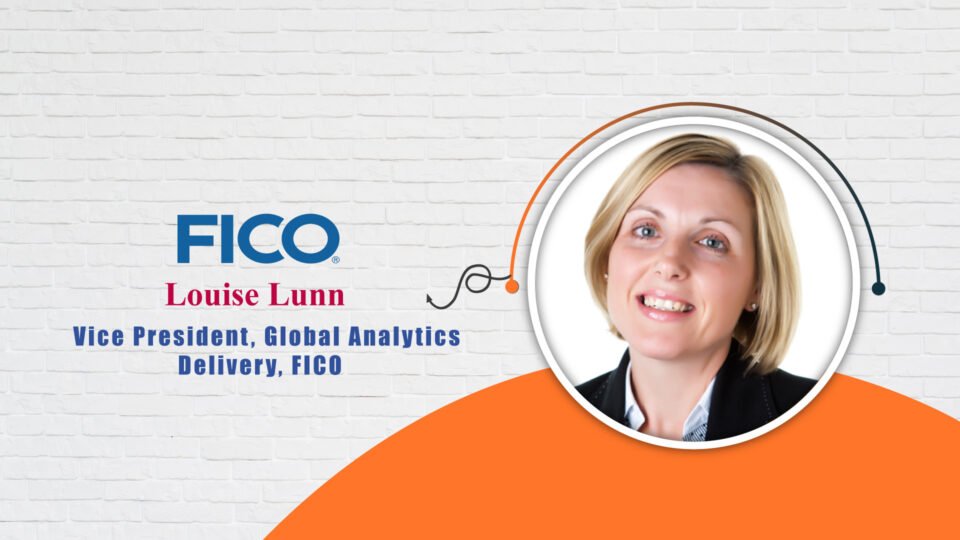Louise Lunn, Vice President, Global Analytics Delivery, FICO talks about the ways in which data science and analytical approach can transform unstructured data
1. Tell us about yourself and your role at FICO?
I graduated from university over 25 years ago with a degree in Systems Modelling – which was all around using mathematical, statistical and computer models to understand, plan and make decisions in complex situations. My first role was modelling within credit risk, and I’ve stayed within the analytics / software space ever since. Fast forward to today: I oversee teams of data scientists worldwide who develop custom analytics solutions and exploratory analytics projects for the world’s top banks, as well as retailers, telecommunications firms, insurance companies and other businesses. I was shortlisted for last year’s Women in Credit Awards, in the Team Leader of the Year – Data, Risk & Analytics category, and am one of 20 women featured in FICO’s award-winning video on the importance of diversity in analytics.
2. What attracted you to a career in analytic software? What life choices led you to FICO?
Bringing together predictive analytics, decision support technologies and strategy optimisation to enrich customer data and allow organisations to proactively manage their relationships with customers was my first role, which felt a huge challenge at the time straight out of university with only theory to pull on. Providing complete solutions requires a thorough understanding of business problems faced by clients, which I have developed over the years. My curious nature is why I have stayed in the consultancy space for so many years — I enjoy demonstrating how our products and services help address a business’s challenges.
3. What does your job entail? What do you find are the biggest opportunities and challenges?
I oversee FICO’s regional analytic delivery teams, as well as our Global Analytic Delivery Center, as they work closely with clients on custom and exploratory projects to design and deploy state-of-the-art, data-driven predictive models and optimization solutions. My teams solve business problems using the latest technologies in data mining, machine learning, statistical modelling, pattern recognition, and performance inference.
COVID has been the biggest challenge I have seen in my career but also a big opportunity to support our clients and provide thought leadership through these uncertain times, helping them with their customer and business priorities. The pandemic has accelerated our customers’ digital transformation programs and at FICO we have adapted well and stayed connected with our colleagues and customers through the use of technology, which has allowed us to deliver projects to our clients’ needs and timescales.
There are many challenges to using AI in some areas of financial services. These include building a team with the right skills, in a very competitive market; deploying AI models within legacy systems; and meeting regulatory requirements for transparency, as AI and machine learning models can be a “black box”. Perhaps the biggest challenge is fighting bias.
A data scientist has to assume that every dataset has bias coded into it, and part of their job is to remove that bias, so that the models they build will be both more accurate and fairer.There are a lot of inexperienced data scientists and “citizen data scientists” who either don’t prioritize this or just don’t know how to do it. That poses a real risk to the business and its customers, and it’s why the field of responsible AI is growing fast. I also believe that diverse teams are important to ensuring models are built without unconscious bias, as a diversity of viewpoints brings new perspectives.
4. What’s a common question you get from customers? What are customers looking for?
The coronavirus outbreak is causing widespread concern and economic hardship for consumers, businesses, and communities across the globe. COVID has accelerated digital transformation, the use of open banking data and the adoption of AI in financial services. So, our customers are looking to FICO to accelerate their digital transformation programs and expanded their use of data and analytics.
The pandemic has heightened the need for systems that can make excellent decisions in an automated fashion. For example, when payment holiday schemes were announced, banks struggled to meet the application volume using call centre staff. FICO introduced scenarios set up in communications software to help banks manage the volume.
We have adapted well to support our customers on their journeys – innovating faster, collaborating efficiently, and delivering value. Our analytics help businesses make better, fairer decisions, replacing guesswork with science.
5. FICO recently partnered with Intermatica. Can you lead us onto that?
One of our most popular products is our FICO Xpress Optimization Suite, which enables businesses to use mathematical optimization to develop the most effective decision strategies. This analytical software allows data scientists and business users to collaborate on solving hugely complex problems with multiple objectives and constraints. We partnered with Intermatica, one of the main Italian players in the TLC field, to bring these tools to all kinds of Italian businesses. Intermatica is a system integrator with over 20 years of presence in markets such as energy & utilities, telecommunications, defense and civil protection, with strong R&D and innovation capacity along the entire value chain of digital transformation. These are all fields that use optimization to increase productivity and profitability.
6. Leading firms like S-Pankki are now deploying FICO’s analytics software. Can you share with us how FICO achieves success is solving the pain points for different organizations?
We take a decision-centric approach to every project. What are our client’s goals, and what are the decisions they make that will take them to their goals. We don’t start with a set of data we want to sell, or a piece of software or even an analytic approach. We take a broader and deeper view of what the organization really needs, and what combination of software, analytics and knowledge will best deliver it. Domain and industry expertise comes along with the solution, as FICO has been doing this since 1956. As a result, we can give customers a deeper insight into their decision making, increased business and analytic knowledge and a greater vision into the longer-term direction of the organization.
7. How has analytics software evolved over time?
Analytical technology has changed dramatically over the last decade, with the rise of big data. Cloud-based analytics made it possible for organizations to acquire massive amounts of computing power for short periods at low cost, and data streaming made it possible to add vast new sources of data.
Since much of big data is relatively unstructured, data scientists created ways to make it structured and ready for statistical analysis, along with ways to integrate analytics with their production applications.
In order to integrate, a component-based or “microservices” approach to analytical technology has arisen. This involves small bits of code, or an API call being embedded into a system to deliver a small, contained analytical result. This is a much more flexible way to work than the software systems of the past.
Another key change in the analytics technology landscape is the rise of artificial intelligence. In the past, most analytical models were developed by data scientists testing hypotheses and looking for patterns in the data. While that still happens today, AI and machine learning are being used to find data patterns automatically. This has advantages — you can quickly discover patterns you might never know to look for — but also challenges, since you still need to understand these patterns for a variety of reasons, including regulatory requirements. In addition, machine learning technologies are increasingly making decisions in an automated way, rather than presenting guidance to an individual to make the call. We will see this expand further in years to come.
The change in analytics technologies has been rapid and broad, and the new tools are more complex and, in many cases, require higher levels of expertise to work with. As analytics has grown in importance over the last decade, the commitments that organizations must make to excel with it have also grown, so many companies have realized that analytics are critical to their business success.
8. How do you see analytics impacting in upcoming years?
We will see a rise in explainable/interpretable AI — platforms transparent enough that a human expert can identify how decisions are made. This is the most exciting development in data science at present. It will enable people to understand and act responsibly, as well as creating more effective teaming between human and machines.
Currently organizations are building teams and piloting AI, but over the coming years this will move to operationalizing AI, driving an increase in streaming data and analytics infrastructures.
9. What movie inspires you the most?
I’m inspired by true stories where you can see and experience the characters facing an obstacle and their journey to overcoming it. One fictional movie that springs to mind is ‘Million Dollar Baby’ where it throws every stereotype about a girl to the wind. It tells us also how people want to slow us down or create barriers by using age, gender, knowledge etc. but commitment, perseverance and spirit conquer. If we are focused and work hard our hopes and aspirations are not bound by limits.
10. What advice would you give to others considering a similar career?
There has never been a better time for women to be part of the technology industry. The industry is realising the impact of diversity, both on the community at large and on companies’ bottom line.
Powered by advancements in computing and AI, there are now huge opportunities to solve interesting problems at a global scale. This opportunity, combined with the momentum to build a diverse workforce, makes it a truly exciting time to be part of the analytics industry.
Don’t be afraid to try working in different areas within the field and seize any opportunity to acquire a new skill or programming language. Stay determined, work hard and never be afraid to voice your opinion!
For more such updates and perspectives around Digital Innovation, IoT, Data Infrastructure, AI & Cybsercurity, go to AI-Techpark.com.

Louise Lunn
Vice President, Global Analytics Delivery, FICO
Louise Lunn is Vice President, Global Analytics Delivery at FICO. Prior to joining FICO, Lunn was a partner at Radar Risk Limited, an independent credit risk consultancy. She previously held leadership positions in Experian’s Decision Analytics group, and at Scorex.

